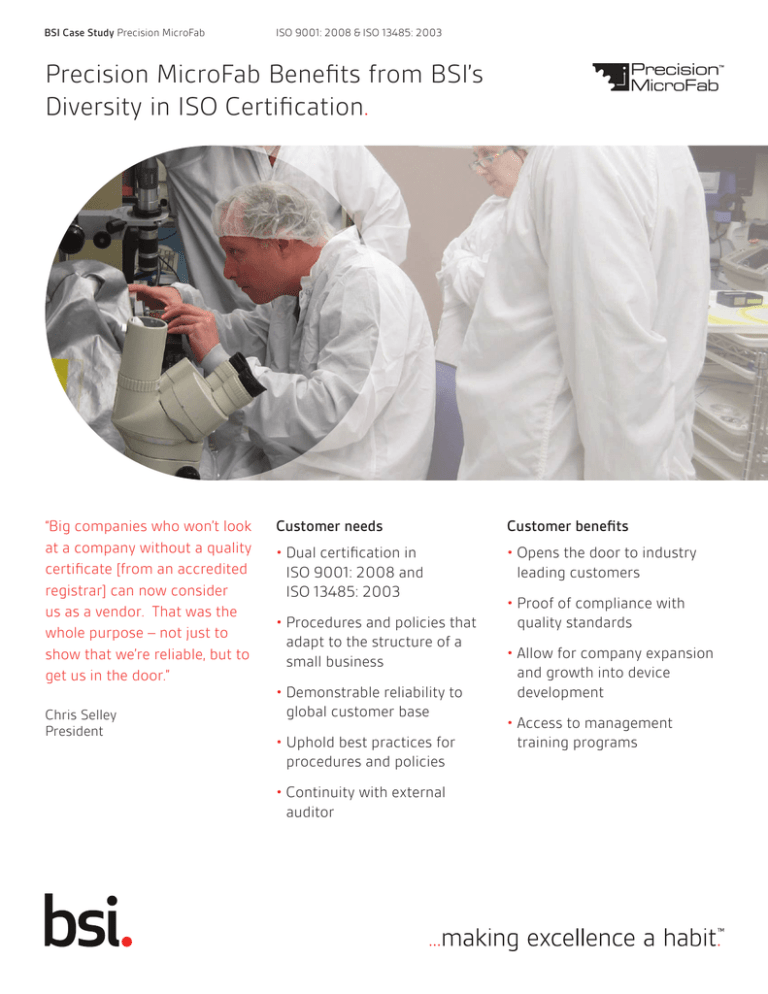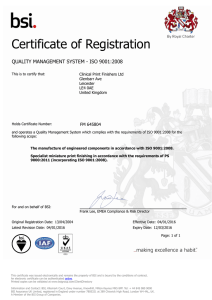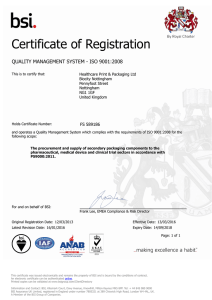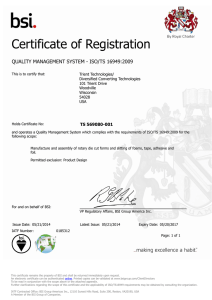
BSI Case Study Precision MicroFab
ISO 9001: 2008 & ISO 13485: 2003
Precision MicroFab Benefits from BSI’s
Diversity in ISO Certification.
“Big companies who won’t look
at a company without a quality
certificate [from an accredited
registrar] can now consider
us as a vendor. That was the
whole purpose – not just to
show that we’re reliable, but to
get us in the door.”
Chris Selley
President
Customer needs
Customer benefits
• Dual certification in
ISO 9001: 2008 and
ISO 13485: 2003
• Opens the door to industry
leading customers
• Procedures and policies that
adapt to the structure of a
small business
• Demonstrable reliability to
global customer base
• Uphold best practices for
procedures and policies
• Continuity with external
auditor
• Proof of compliance with
quality standards
• Allow for company expansion
and growth into device
development
• Access to management
training programs
BSI Case Study Precision MicroFab
ISO 9001: 2008 & ISO 13485: 2003
Customer Background
Customer needs
Founded in 2002, Precision MicroFab
LLC, based in Severna Park, MD, designs
and manufactures microscopic parts
and devices to fit customer-specific
requirements. The team of experts at
Precision MicroFab takes the time to
understand client challenges and use
their collective micro-manufacturing
knowledge and experience to provide
unique solutions. Services extend from
designing and generating 3-D CAD models
and complete engineering drawing
packages, right through to fabrication
and validation of the micro-devices from
prototype to production. Additionally,
Precision MicroFab specializes in
just-in-time micro-manufacturing of
parts. Their impressing list of clients
includes NASA, Northrop Grumman,
Abbott Laboratories, Boston Scientific,
Zimmer, Goodrich, Honeywell, KLA Tencor,
Johns Hopkins, Cornell and MIT.
ISO 13485 is based on the ISO 9001
process model approach, but has had
some elements removed that are not
appropriate as regulatory requirements
and other elements added to better
address the quality requirements of the
medical device industry. As a globally
harmonized standard, certification to
ISO 13485 will meet most regulatory
requirements in a host of countries
including the EU. Additionally,
certification to ISO 9001 may bring
further business benefits as it reflects
a much stronger commitment to
customer service and continuous process
improvement. Manufacturers who serve
both the medical device market as well
as non-medical technologies markets will
find it very useful to consider certification
to ISO 9001; or at the very least become
compliant with its requirements. As this
is the case with Precision MicroFab, they
decided to seek certification under both
standards.
Currently a small operation with a
full-time staff of five, the company’s goal
is to attract larger clients, to expand
its engineering and design services.
Precision MicroFab serves the medical
device, life sciences, microelectronics,
and aerospace industries.
Precision MicroFab is a newcomer
to the ISO quality certification world.
According to Chris Selley, President at
Precision MicroFab and the company’s
owner, the primary decision to become
ISO 9001: 2008 and ISO 13485: 2003
certified was to comply with major
medical device companies’ requirements
for quality and regulatory certification.
A medical device manufacturer’s quality
management system is the foundation
for maintaining regulatory compliance,
driving improvements, effectiveness,
efficiency, and achieving stakeholder
confidence in the manufacturer and
“Big medical device companies
won’t even consider a company
without a [ISO 13485]
certificate, can now consider us
as vendors,” notes Selley.
their products. The requirements
of ISO 13485 provide the model for
quality management system building
blocks of success. Whether a medical
device manufacturer is a single-site
start-up, like Precision MicroFab, or a
multinational corporation, an ISO 13485
certification indicates to all stakeholders
that a medical device manufacturer
is dedicated to bringing the highest
quality products to market and that they
are a manufacturer fully committed to
quality and compliance with regulatory
requirements.
The company embarked on its
certification mission in April 2011 and
successfully achieved both ISO 9001
and ISO 13485 certifications in
December 2011.
BSI Case Study Precision MicroFab
ISO 9001: 2008 & ISO 13485: 2003
Benefits
Selley explained that if a company is
ISO 13485 certified, then it is relatively
easy to qualify for ISO 9001. “As long
as we had ISO 13485 we were on the
path for ISO 9001,” explained Selley.
“ISO 9001 makes sure everyone
worldwide is working under the same
(quality) guidelines. When you have that
certification, you’re letting everyone
(know) that you’re following the same
guidelines as everyone else.” Selley
says ISO 13485 is a very challenging
certification because manufacturing
medical devices requires compliance
with a host of regulations. “Since we
don’t design and put devices onto the
market, but rather manufacture devices
based on our customers’ drawings,
we don’t currently fall under those
guidelines. But we wanted to have
procedures in place so we can work
with clients to design medical devices,
micro-manufacture them and bring them
to market, we’ll be able to do that,” he
explained.
Becoming ISO certified is a daunting
task for a company of any size. But for a
company as small as Precision MicroFab,
there were additional challenges that
required specific attention. For example,
procedures are typically assigned to
certain roles or job titles. This works
fine when the company being certified
is large enough to accommodate all of
the defined positions. However, it gets
a bit confusing when one individual
performs an assortment of functions. In
searching for the right certification body,
Precision MicroFab was looking for one
that was flexible enough in its processes
to work with a small company and could
provide a high level of service
at reasonable cost. Also, since Precision
MicroFab was new to the certification
process, they needed to feel confident
that their external auditor would have
a lot of patience, understanding and
would provide adequate guidance while
avoiding any conflict of interest.
According to Selley, the process took
eight months from start to finish. In
April, armed with instruction manuals on
certification procedures, they engineered
a production flow that worked for
the company and complied with the
certification standard. They signed
on with BSI in June, and by the time
of their stage 1 internal audit in early
August, they had drafted a manual that
contained all the procedures and forms,
each one designed in-house. They met
with the BSI auditor for the first time in
August, who reviewed their progress and
identified opportunities for improvement.
The most important part of the process
was making sure Precision MicroFab
was found to be compliant with the
requirements, policies, and objectives as
outlined in ISO 13485. This required a lot
of information gathering and hard work.
The knowledge he and the rest of the
team gained through learning about
necessary procedures, combined
with producing a procedure manual
that contains all the procedures and
forms that were all designed in house,
has helped streamline the company’s
manufacturing processes. With two
members of the team now certified as
lead auditors, checks and balances are
in place to maintain compliance. Being
able to post the certification on the
company website was a proud moment.
Selley says the company has created a
brochure showcasing the certifications
to effectively market this achievement.
One marketing benefit specific to BSI was
the opportunity to participate in a case
study. No other certification bodies Selley
researched offered that opportunity.
As Precision MicroFab just received its
certifications in December, the financial
benefits have yet to be fully realized,
notes Selley. However, he anticipates the
certification to boost revenues as soon as
Q2 2012. “We’re hoping to be able to get
in more clientele. When people visit our
website and see our BSI certification, that
lets them know we have a conforming
management system,” he explained. “Big
companies who won’t look at a company
without a quality certificate [from an
accredited registrar] can now consider us
as a vendor. That was the whole purpose
– not just to show that we’re reliable, but
to get us in the door.”
“Just the process of becoming
certified was beneficial to
Precision MicroFab’s growth,”
notes Selley.
BSI Case Study Precision MicroFab
ISO 9001: 2008 & ISO 13485: 2003
Why BSI?
“BSI’s responsiveness was
terrific. Whenever I had a
question, they were right on
top of it,” said Selley.
Regardless of a company’s size, BSI
stands ready to help navigate the
challenging waters of certification.
That’s because for over 100 years,
BSI has led the way in developing the
concept of standards and making them
relevant to your business. No other
certification body can offer the expertise,
knowledge and recognition that come
with a BSI certificate. Additionally,
the BSI auditing process delivers the
outputs that manufacturers require of
an effective audit, an experience that is
predictable, transparent and responsive
with consistent local and global
resources, reliable office back-up, and
accessible support.
“Our auditor was great with the learning
curve; when we didn’t understand
something he provided interpretation so
we could get a picture of how it should
look. He was also hard on us when he
needed to be, while understanding
that the whole process was something
different for us.”
BSI’s flexibility when working with a
small company was paramount to
Precision MicroFab’s decision to hire
them as a certification body. Selley
said the company’s responsiveness to
initial inquiries was another deciding
factor. “They provided better responses
to my questions, and I could get a hold
of someone right away,” he said, adding
that they were also more efficient and
more cost-effective of the companies we
considered. Other companies also had
more add-on expenses, such as airfare,
hotel and gas, which BSI didn’t have.
As Precision MicroFab continues to grow,
they will continue to take advantage of
BSI management training programs.
Overall, Selley foresees a lasting
relationship with BSI.
Selley says he expects BSI will be on
hand to perform annual surveillance
audits to ensure the company
is maintaining compliance. BSI’s
surveillance audits cover both standards
simultaneously, and assessors are kept
informed and trained on the latest
developments in the industry.
BSI Group America Inc.
12110 Sunset Hills Road, Suite 200
Reston, VA 20190-5902
USA
Tel: +1 888 429 6178
Fax: 1 703 437 9001
Email: inquiry.msamericas@bsigroup.com
Web: www.bsi-entropy.com
BSI Group Canada Inc.
6205B Airport Road, Suite 414
Mississauga, ON
L4V 1E3
Canada
BSI Brasil Sistemas de Gestão Ltda
Rua Gomes de Carvalho, 1.306 – 11°
andar – Vila Olímpia
São Paulo - SP
CEP: 04547-005
Tel: 1 800 862 6752
Fax: 1 416 620 9911
Email: Inquiry.canada@bsigroup.com
Web: www.bsi-entropy.com
Tel: +55 11 2148 9600
Fax: +55 11 2148 9601
Email: bsibrasil@bsibrasil.com.br
Web: www.bsi-entropy.com
The BSI certification mark can be used on your stationery, literature
and vehicles when you have successfully achieved certification.
The mark shall never be applied directly on the product or service.
BSI Group México, S. de R.L. de C.V.
Torre Mayor
Av. Paseo de la Reforma No. 505
Piso 41 -Suite CCol. Cuauhtémoc, C.P. 06500
México, D.F.
Tel: +52 55 5241 1370
Fax: +52 55 5241 1371 Email: informacion.msmexico@bsigroup.com
Web: www.bsi-entropy.com
Copyright © 2012 The British Standards Institution. All Rights Reserved.
BSI/USA/308/MS/0212/E
Your business could benefit from ISO 9001 and ISO 13485, just like Precision MicroFab LLC.
To find out more, visit www.bsiamerica.com/quality



